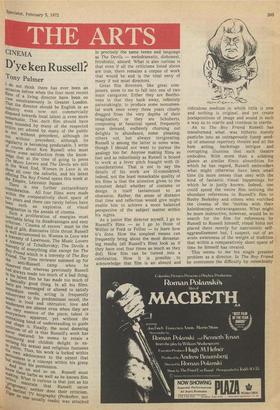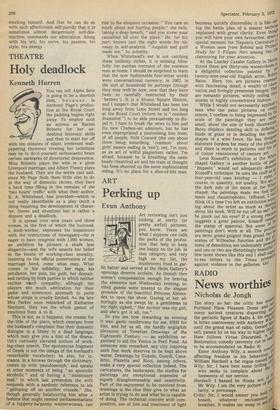CINEMA
'ye ken Russell?
Tony Palmer
do not think there has ever been an occasion before when the four most recent This of a living director have been on "ew simultaneously in Greater London. That the director should be English in an iddlistrY even now not commercially disposed towards local talent is even more remarkable. That each film should have been hounded by many of the respected c,rities yet adored by many of the public Is not without precedent, although its Rot without precedent, although its regularity is becoming predictable. I write course about Ken Russell who must derive some satisfaction from the know.„le,dge that at the time of going to press "le Music Lovers and The Devils are still ill the West End, Women in Love is on tow all over the suburbs, and his latest the The Boy Friend opens this week at Lae Empire, Leicester Square. There is one further extraordinary consideration. All four films were made Within the comparatively short space of htw° Years and there can rarely before have een such an explosion of visual iraagination in the annals of cinema. . Such a proliferation of energies must in t.,y evita er,iticisinol. bring its disadvantages and easy 'Cinema of excess' must be the k. Ind of glib, dismissive little thrust Russell Is well accustomed to. Women in Love was a travesty of Lawrence: The Music Lovers travesty of Tchaikovsky; The Devils a BravestY of everything else except for The voy Friend which is a travesty of The Boy thrierid. The Time reviewer summed up for obe anti-Russell camp when he h served that whereas previously Russell ad always made too much of a bad thing, 'art his latest film he has made too much of facts basically good thing. In all his films, irrile' are , rearranged or altered to satisfy satZate needs; acting is frequently ronsie servient to the predominant mood; the tem Is loud and obtrusive; love and the erness are absent even when they are ev„. verY essence of the piece; talent is jrYWhere apparent, yet without the a:training hand of understanding to guide eriti s.haPe it. Finally, the most damning rievnelsrn of all is that Russell's work has cori Matured; he seems to retain a oreis,.ddhig and childish delight in exin Pp his sexual and religious fantasies his Thus, his work is locked within serio?fl adolescence to the extent that hat ,.s.ness is a concept within his grasp Anwc;t11011t his permission. ths° and so on. Russell must makio ese barbs as well as he knows film criticsg. What is curious is that just as his tirogro., rdahltain that Russell never ea—„ses,' neither does their criticism. aristes_li. TV biography (Prokofiev, not voe usually reads) was attacked in precisely the same terms and language as The Devils — melodramatic, dishonest, fetishistic, absurd. What is also curious is that even if all the criticisms listed above are true, there remains a corpus of work that would be and is the total envy of many if not most directors. Great film directors, like great composers, seem to me to fall into one of two main categories. Either they are Beethoyens in that they hack away, infinitely painstakingly, to produce some monumental work once every three years clearly dragged from the very depths of their imagination; or they are Schuberts, composing at fanatical speed, frequently upon demand, endlessly churning out delights in abundance, some pleasing, others not, but always invigorating. Russell is among the latter in some wise, though I should not want to pursue the analogy too far. Anyone making films as fast and as relentlessly as Russell is bound to work at a fever pitch fraught with illconsiderations. That is not to say the details of his work are ill-considered; indeed, not the least remarkable quality of his films is that the attention given to the minutest detail whether of costume or design is itself tantamount to an obsession. Rather, the sense of distance that time and reflection would give might enable him to achieve a more balanced perspective of the subject matter within his sights. As a junior film director myself, I go to Russell's films — as I go to those of Welles or Ford or Fellini — to learn how it's done. How the simplest means can frequently bring about the most devastating results (all Russell's films look as if they have cost four times as much as they did). How film can be turned into a celebration. How it is possible to acknowledge that film is an absurd and ridiculous medium in which little is new and nothing is original, and yet create juxtapositions of image and sound in such a way as to startle and continue to startle.
As to The Boy Friend Russell has transformed what was hitherto merely pastiche into an outrageously funny sendup of amateur repertory theatre and all the ham acting, backstage intrigue and corrupting illusions that such theatre embodies. With more than a sidelong glance at similar filmic absurdities for which he has regard, Russell embroiders what might otherwise have been small time (in more senses than one) with the kind of fantastic visual happenings for which he is justly known. Indeed, one could spend the entire film noticing the abundant references •in Russell's film to Busby Berkeley and others who enriched the cinema of the 'thirties with their kaleidoscopic extravanganzas. What might be more instructive, however, would be to search for the film for references by Russell to Russell himself, visual hints not placed there merely for narcissistic selfaggrandisement but, I suspect, out of an acute awareness of the weight of tradition that within a comparatively short space of time he himself has created.
This seems to me his single greatest problem as a director. In The Boy Friend he overcomes the difficulty by relentlessly mocking himself. And that he can do so with such affectionate self-parody that it is sometimes almost dangerously self-destructive, commands our admiration. Along with his wit, his nerve, his passion, his style, his energy . .











































 Previous page
Previous page